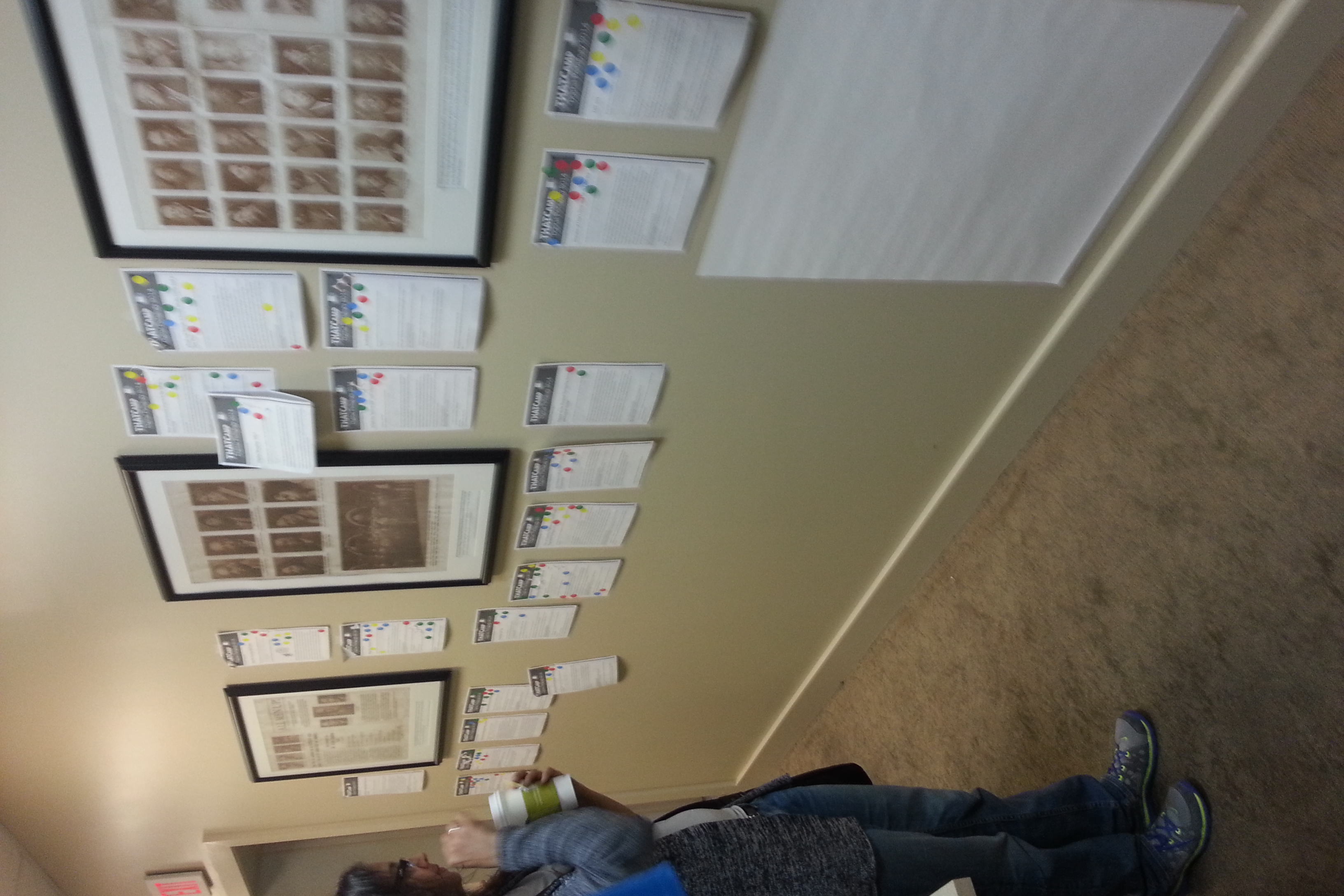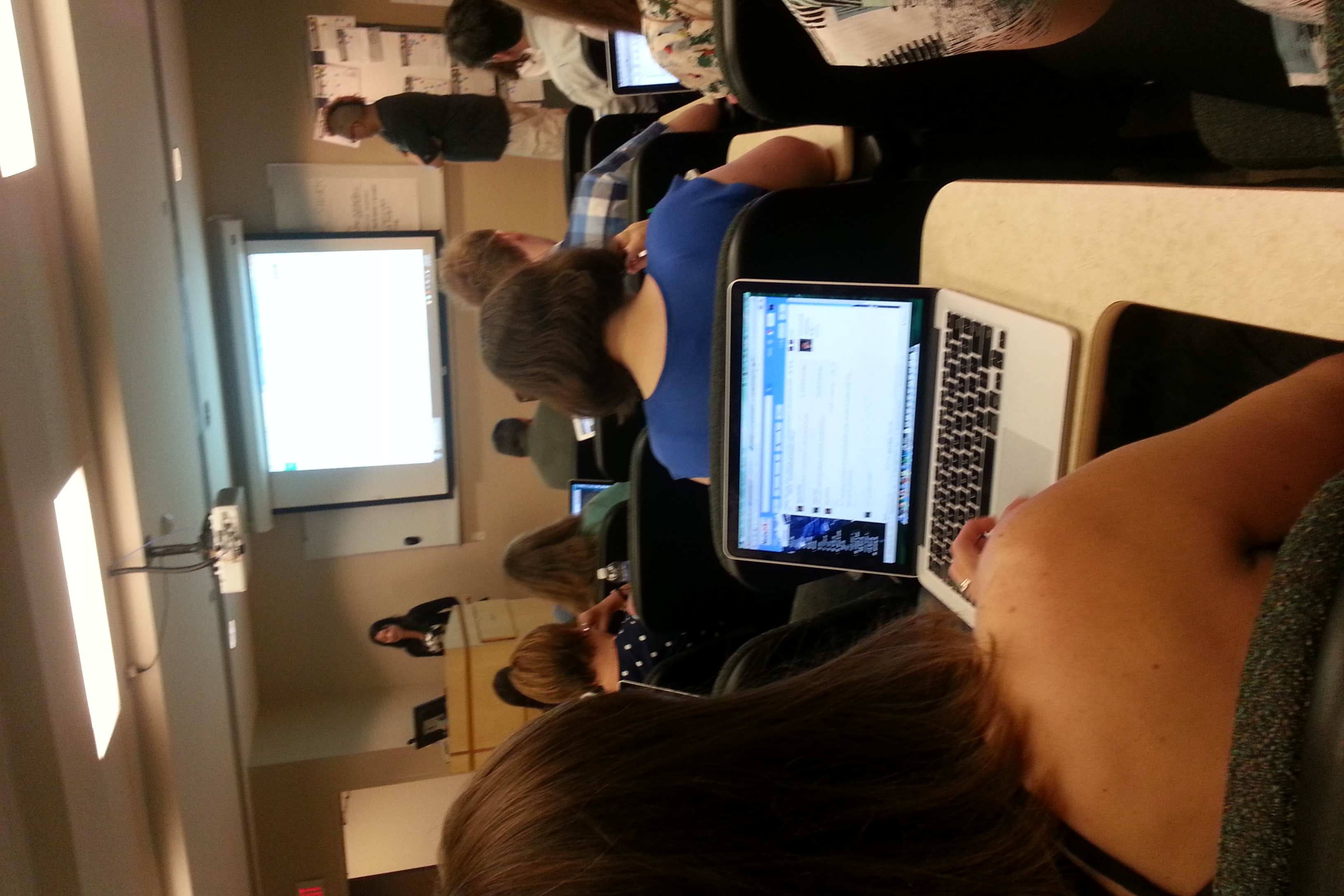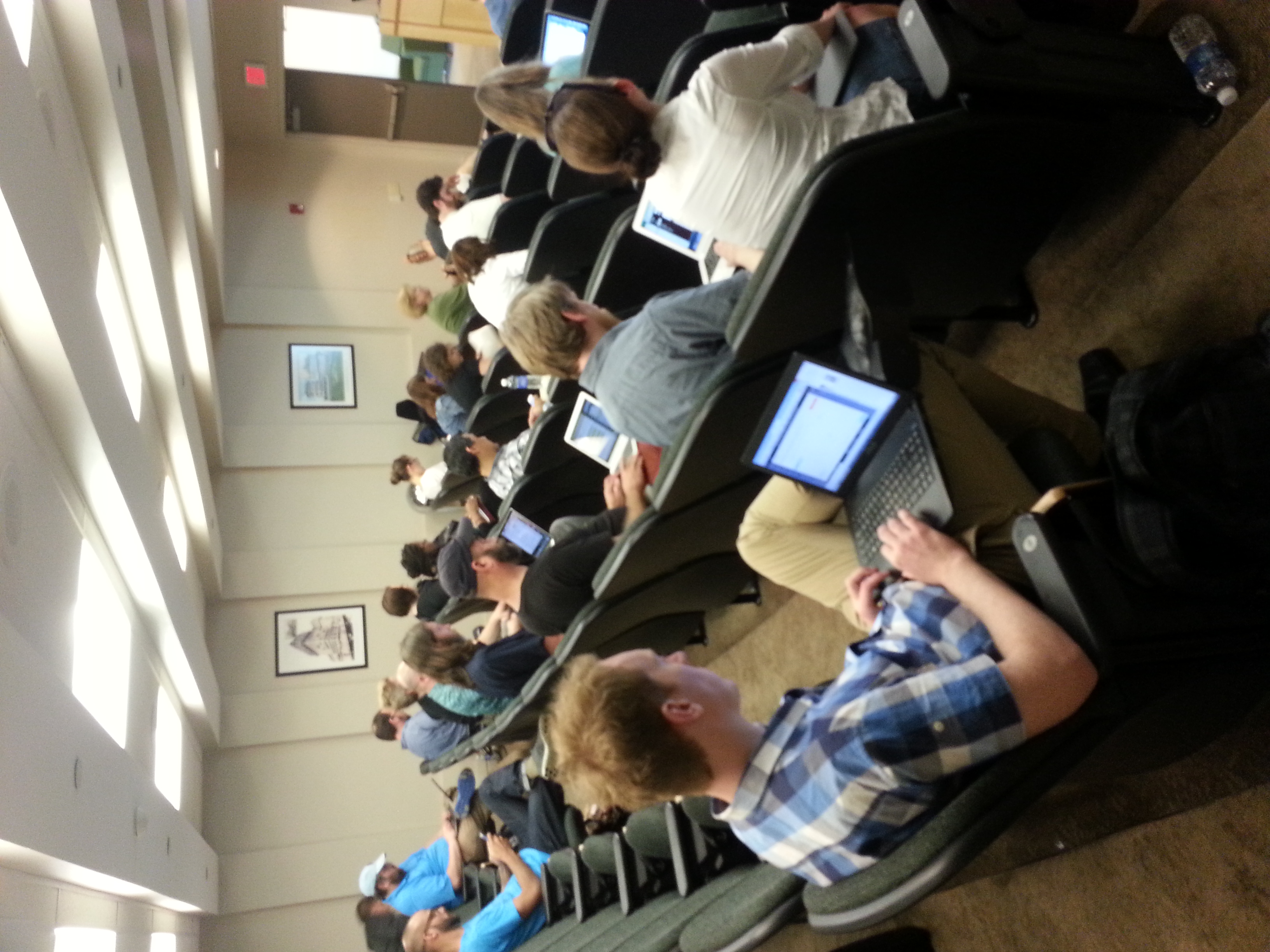The Story Of Crass by George Berger
The Western Canon: The Books & Schools Of The Ages by Harold Bloom
The Stiehl Assassin by Terry Brooks
We Created Chavez: A People's History of the Venezuelan Revolution by George Circcariello-Maher
A Penelopean Politics: Reweaving The Feminine In Homer's Odyssey by Barbara Clayton
Atari To Zelda: Japan's Video Games In Global Contexts by Mia Consalvo
The Odyssey of Political Theory: The Politics of Departure and Return by Patrick J. Deneen
Titan Screwed: Lost Smiles, Stunners, and Screwjobs by James Dixon
I Hated, Hated, Hated This Movie by Roger Ebert
K-Punk: The Collected & Unpublished Writing Of Mark Fisher by Mark Fisher
Transformers: Regeneration One Volumes 1-4 by Simon Furman
Soccer In Sun & Shadows by Eduardo Galeano
Radioactive Man: Radioactive Repoository by Matt Groening
GI Joe Volumes 1-33 by Larry Hama
My Hero Academia Volume 1-3 by Kohei Horikoshi
Death Of The Territories: Expansion, Betrayal, and The War That Changed Pro Wrestling Forever by Tim Hornbaker
The New Testament As Literature by Kyle Keefer
Ajax, The Dutch, The War: Football In Europe During The Second World War by Simon Kuper
Marvel Masterworks: The X-Men Volume One by Stan Lee
Kill Shakespeare Volume One by Conor McCreery
Norwegian Wood by Haruki Murakami
One Piece Volume One by Eiichiro Oda
Mega Man 3 (Boss Fights) by Salvatore Pane
Football For A Buck: The Crazy Rise & Crazier Demise of the USFL by Jeff Pearlman
Shakespeare and the Middle Ages by Curtis Perry
Electronic Literature by Scott Rettberg
Capitalism: A Ghost Story by Arundhati Roy
Where We Go From Here by Bernie Sanders
Corbyn: The Strange Rebirth of Radical Politics by Richard Seymour
Essays by Wallace Shawn
Night Thoughts by Wallace Shawn
1923: A Great Depression Memoir by Harry Leslie Smith
Harry's Last Stand: How The World My Generation Built Is Falling Down and What We Can Do To Save It by Harry Leslie Smith
Love Among The Ruins: A Memoir of Life and Love in Hamburg, 1943 by Harry Leslie Smith
Strike For America: Chicago Teachers Against Austerity by Micah Uetricht
The Unknown Odysseus: Alternate Worlds In Homer's Odyssey by Thomas Van Nortwick
Never Any End In Paris by Enrique Vila-Matas
The Future of Our Schools: Teachers Unions and Social Justice by Lois Weiner
A Politics of Love: A Handbook For A New American Revolution by Marianne Williamson
Brilliant Orange: The Neurotic Genuis of Dutch Soccer by David Winner
ThatCamp Digital Pedagogy: An Overview
I had a great time at ThatCamp Digital Pedagogy last week. It was nice to go home to Stockton for the day (in fact, the main room we were in was where I had a class with Scott Rettberg back in 2005!). I will post my notes from various sessions, including the one I ran on the differences between art and craft in the writing classroom, in the coming weeks. Big thanks to Adeline Koh for organizing this ThatCamp! I was able to do some promotion for ThatCamp Community College next year and I believe a handful of campers will be coming.
Update: Here are the shared Google Docs from the unconference.
Adeline Koh beginning the day.
Hardware Media & Radio Interview
Originally published on the website for the now defunct Hardware Media & Radio in 2005. Thanks for Dave K for letting me republish it here.
How,
why and when did this show start?
I've
always wanted to do a radio show. Well, my first semester of college
I filled in for a friend's show one time but I got thrown off the air
after playing an Agnostic
Front
song. Originally,
Signifying
Nothing
was just a weblog. I toyed with doing it as a print fanzine for a
while, but at this point in my life I don't have the time or money to
put into doing a good print fanzine. I started blogging in the
spring of 2004. I had just completed my senior thesis (on
intertextuality and the writing of Jorge
Luis Borges-Pretty
soon I will have a version of this Online) and my professor, Dr.
Scott Rettberg,
had
a weblog.
At the time I was becoming more curious about blogging and new media
in general. Dr.
Rettberg's weblog,
and
a
few
others,
inspired me to get started on my own.
By
the end of that term I, and a few other classmates, decided to start
blogging. Besides me, one
of them
still does one. I started out just doing a pretty ordinary weblog.
I would comment on personal issues, political stuff, and news related
to new media, music, video games, etc. Earlier this year I moved to
Word Press and parked it at my own domain www.wpwend.com
After about a year of blogging, I came to the conclusion that I needed to get back into the game when it came to hardcore. I had already seen a few weblogs and webzines be upload, I was offered a position at a few even, but I wanted to do something on my own. Signifying Nothing started as a way for me to archive all of the fanzines (see next answer) I had done in the past plus some new material. After the summer of 2005 I started to put up more new stuff. This mostly consisted of record reviews and a couple interviews. I took a hiatus because of school from November to January. At that point I came back for a couple weeks and then took another month off to move Signifying Nothing to my domain and its new address at sn.wpwend.com
I began to podcast pretty much the same way I did blogging. I really liked a lot of the podcasts I had been listening to and decided I should do one. If you've listened to recent episodes you have heard me talking about some of them. After talking to a few people who already were podcasting I waded my feet into the water in February. So far I have done fifteen or so podcasts. Most of them I am very happy with. There have been a few minor technical problems along the way. I have already changed the format around a few times and am planning to do so again soon. As of August the weblog portion of Signifying Nothing will have a monthly, not weekly, update. I will upload reviews, interviews, and other stuff at that time. The podcast will still be weekly. I really like creating the show each week and work hard to improve it.
As for the name, I've had it on the back burner for a few years. When I was still considering doing a print fanzine Signifying Nothing was one of the names I thought about using. Another was Running With Scissors. I came up with Signifying Nothing while sitting in Professor Tompkins' Shakespeare class back in the fall of 2003. After a lecture on Macbeth where we had just passed by Macbeth's famous speech in V.v. I said to my friend Lauren that Signifying Nothing would be a cool name for a fanzine. It stuck with me after that I guess.
Have you been involved in anything else punk/hardcore related (bands/fanzines/show promotion)?
Over the years I have done a number of fanzines. In fact, before I was really involved with the DIY hardcore scene I had worked on a half sized fanzine the summer after eighth grade into ninth grade. I wrote articles about animal rights and typed up my tape trading list (even before I was into hardcore I was an avid live show collector-at this point my list primarily consisted of Metallica, Nirvana, Sonic Youth, and stuff like that). For reasons I can't recall I never finished it. What probably happened was that, as I got more directly involved with punk rock in ninth grade, I became embarrassed of liking metal and grunge.
A year or two later I began working on a fanzine which would use the name I had picked out a few years earlier: Assimilation Or Oblivion. I had read that name in a book about Native Americans when I was younger and it stuck with me as a pretty cool and “punk” sounding phrase. A Or O had some pretty horrible writing about The Straight Edge, animal rights, and some other more trivial stuff. There were also interviews with 25 Ta Life and h20. I was also supposed to interview Fastbreak and Mouthpiece but both interviews, sadly, feel through. I really wish they hadn't. A Or O also had a piece of fiction I had written for English class which, while pretty awful, had a few really accurate pieces of foreshadowing that coincide to the real life events almost exactly to the time “in the future.” I printed a few hundred of them and actually got rid of most of them via distros. I remember Rick Healey took a lot and that was appreciated. I started a second issue but over the winter break the next year I scrapped it and decided to start over with a new name and a decidedly more cut and paste DIY style.
Around this time I also remember having a conversation on the phone with you, Dave, where you told me to keep trying and to give doing a fanzine another shot. Thanks man.
After spending the final half of my senior year of high school interviewing bands and putting together content, What Was Said Fanzine was born. #1 came out in October of 1997 and had Hands Tied, Breakdown, One King Down, Ten Yard Fight, Uprise, and a few others. For the most part, I remember it being pretty good. I printed four hundred (I remember because I printed two hundred twice!) and got rid of them via distros and the Internet. Connections in Europe, Canada, and Australia also helped. Especially Australia.
Oh yeah, before I forget, I also did a one pager before #1. This was given out at a couple shows during the famed summer of 1997. Side a featured some awkward and random observations by me on nothing really that important. Side b featured one of our friends threatening another friend with violence for breaking edge. Twenty-six year old Bill would like to chat with seventeen year old Bill about why it wasn't a good idea to enable him by printing this.
There was also another one pager sometime in early 1998, but that only made it to a few shows. I sent a big package of them to friends in Europe and Australia too.
Later in 1998 I rechristened What Was Said as In The Blink Of An Eye Fanzine. Why I kept naming zines after NJHC records is beyond me. ITBOAE lasted two issues. The first (listed on the cover as #2 for some reason) had the Hands Tied and Uprise interviews from What Was Said plus By The Grace Of God, Weapon X, Full Speed Ahead, and others. The personal writing in this one is quite embarrassing. Following my established pattern, I did another one pager which had me ranting about “metal” in hardcore, emos, and the usual silliness from the era. I began to plan another issue which was going to have Mainstrike, Monster X, and Floorpunch. I even did ads and probably took a couple preorders. Due to a variety of personal problems, which included one near failing out of college and one really nasty and rather humiliating breakup with a girlfriend, this never really got off the ground.
Meanwhile, over winter break 1997/1998 I began doing a one pager called Broken Behind This Wall. More NJHC names. What the fuck. BBTW was in the vein of Radio Riot, although I wouldn't actually see an issue of Radio Riot until a few months later. Whoops. BBTW had interviews with By The Grace Of God (same one from above), Ten Yard Fight (why did I interview this band twice?), and Reach The Sky. After issue six I started issue seven while in a bout of serious depression. I wrote some really scathing things about various bands and people. Well, more than usual I guess. After showing it to a few friends I was told I should be “extremely fucking cautious” about printing it, so to speak. Wisely, I decided to scrap it.
A year later I decided to do another fanzine. Parade Brigade Fanzine was born. This time around, hoping to keep myself from saying anything stupid, I enlisted a few friends to join in on the fun. #1 had Floorpunch, Ensign, 97a, Spazz, DRI, Arms Reach, and The Judas Iscariot. We printed approximately five hundred and got some pretty positive reviews.
Due to personal issues we didn't do another issue for over a year. In between I did two issues of a new personal fanzine called This Isn't Me. Both are filled with my random ranting about nothing important or interesting. I burned the originals a few years ago.
Near the end of 2000, with John, myself, and Justin now all attending the same college we huddled up and got our second issue out. We reprinted old interviews with SSD and Minor Threat. We also dug up an interview with Rain On The Parade that John and Justin had done in 1997 but never released. We printed one hundred for the first show we took them to. We sold some and gave some to friends, including members of bands we had interviewed in the first issue. At least two of those people were observed tossing it in the trash after I walked away. Thanks a lot assholes. Both bands ended up being huge disappointments anyway, so whatever.
A few months later, while driving to campus with John, I decided we needed to have a new issue out for a show that Friday evening. John agreed and I got to work. Somehow, in a span of 72 hours, we put together a ten page fanzine and interviewed both Fit For Abuse and Shark Attack. The day of the show all we had to do was wait for John's personal page. I remember being pissed he was taking so long that day to send it over! Yeah, because giving him a 72 hour notice to have a drafted, edited, and finalized page is totally fair. I was such a jerk back then a lot of the time.
So issue three had Shark Attack, Fit For Abuse, and reprints of interviews with The Faith and Siege. There was also supposed to be a reprint of a Larm interview but I have no idea what happened to that or the H-Street interview I did around that time. We printed a couple hundred on the way to the show. Interpersonal, and personal, problems kept us from ever working officially on another issue. By that time I was really distancing myself from my friends who were drinking and this included the people I did Parade Brigade with. Right or wrong, we all barely spoke that summer.
Unofficially, I continued working on a fourth issue. I interviewed Eric Ozone and Dan O'Mahoney. We also had leftover interviews with Kill Your Idols, The Purpose, and a couple others that we never printed we could incorporate. At one point, I spoke to another friend about possibly having her start working on Parade Brigade, but that was more about me trying to get in her pants than anything else. I wanted to interview Out Cold and Voices Forming Weapons, but neither interview happened.
In September 2001 multiple events (not the one you are thinking of) the first few weeks of the month put a stake through the heart of the fanzine. We never officially ended it, but it was done.
I've tried to do bands over the years, but none of them ever got anywhere. I had done guest vocals for local ragers Fists Of Fury in 1997. After their singer (the person who was threatened in the fanzine above) broke edge I would always sing their covers of Bottled Violence and Straight Edge.
I've done a lot of behind the scenes stuff with booking and promoting shows but never have officially put one on myself.
Why a punk and hardcore music radio show?
Hardcore Punk is who I am. If The Dead Kennedys had not come into my life when I was fourteen I would be long dead. Doing things via podcasts and weblogs is just an extension of that. Podcasting and blogging, for the most part, is a pretty DIY venture. Of course corporations are starting to assimilate it and use “viral” marketing to trick the masses into thinking they have an effect on the popularity of something when it's popularity has already been determined and they are just using viral marketing to sucker you into thinking you have a say.
I listen to a variety of podcasts: some are musical, some political, some just do really neat things. I get my daily news from Democracy Now!. I listen to shows like Sonic Overload, Harmony In My Head, and All Go No Slow! to check out cool music. I also listen to a lot of academic and literary podcasts.
How do you decide what to play?
When I first decided to podcast I went through my collection, record by record, and picked out one or two songs I'd like to one day play. Since I do everything from mp3 I simply created a separate folder for all of these songs. I also have another folder with sub folders for bands I am going to do features on eventually. Whenever I get a new record or live show I go through it and pick out a song or two and add them to the folder. Each week when I am plotting out the show I pick some songs to play.
What kind of set up for broadcasting do you have at your disposal?
When I started doing the show the only thing I purchased was a USB mic. Everything else is freeware or open source programs. I am a big proponent of open source and so should you. I think it's a pretty “hardcore” thing. I use a few different programs to cut the show together into one file, equalize the volume levels, and some other stuff. I've got the process of creating the show down pretty well now. I can bounce between programs really quickly and get the show together easily.
What media do you prefer on your show (vinyl, CD, mp3, etc)?
Everything comes from mp3. Since my music is already stored on my desktop computer (I do all of Signifying Nothing on my laptop) it's easiest to just keep it there. I've never, besides some stupid technical mistakes on my end one week, had any problems doing this. Having everything on my computer also allows me to mix and match out songs and keep a copy of the songs I'd like to play, as I noted above, stored on my computer in a separate folder.
We
all know that the 1980s was the best time for punk and hardcore in
general. Now that we are more than halfway in the 00s, what time
period do you think is better: the 1990s or the 00s?
Despite
the slow start for the first few years, I have to say that the 00's
win easily. The nineties had some great bands don't get me wrong.
But for every Devoid
Of Faith, Rorschach, Crossed Out, Team Dresch,
or Floorpunch
you had fifty bands that sounded like Snapcase.
Or worse. It was a lot harder to avoid that garbage at shows too
because a lot them intermixed with the good stuff. Even into the
late nineties that still happened. These days it is so much easier
to avoid the dumb stuff. I'll stick to bands like Direct
Control
and Mind
Eraser
thank you very much. I can't even keep count of the amount of great
bands right now, and this is coming from someone with an irrational
hatred of most bands. Things are really taking a good turn. While
there are regrettably a lot of dumb bands who call themselves
“hardcore” who have no right to, these days you can avoid them
pretty easily. That's another great thing about blogging and
podcasts. I can listen to Sonic
Overload
each week and check out the bands Al is reviewing to see what is new
and good. I've found out about a lot of good bands that way. All
the emo, chugga chugga metal crap, and amazingcore trying to deceive
people is not going to win as long as there are great bands like
Direct
Control.
Seriously if you listen to a band like Direct
Control
and then still wanna listen to the bad stuff you just suck.
Whats the scene like in your local area?
I don't really know what is going on in Manahawkin right now. Most of the people I went to shows with have all moved, “grown up,” or just aren't all that involved anymore. A few people book local bands in Waretown, which is pretty cool. Our good friend Leslie Adam, who runs the Fate clothing store in town, books sometimes here in Manahawkin. She did the Vision show last year. Ian Dickson and some others are also booking in Toms River too. It's nice when shows are twenty minutes away instead of two hours.
What kind of reaction are you getting from broadcasting on-line? Any weird requests?
I've received a lot of praise from people who I admire. I've received kind emails from people all over the world. Nothing too negative as of yet, but I did receive some nasty comments on Signifying Nothing awhile back from some cronies of the idiots who were harassing the audio trading blog a few months ago.
No weird requests quite yet. The one thing I was worried about was labels really trying to push their stuff at me to play or get pissed if I didn't play something. For the most part, that hasn't happened. I am not playing stuff on the podcast that I don't like and no one seems to have a problem with that. I did reject and refuse to review one label's stuff because their policy about “downloading” sounded like Lars Ulrich wrote it.
Where do you think the future of Internet radio and podcasting is heading?
Well, with net neutrality potentially being gutted, DRM, the UN screwing with podcasting, and bands threatening people over blogging about their demo tapes from twenty years ago I'm sure podcasting will get mucked up soon enough.
That last one really burns me. It is no surprise when our wonderful representatives in Washington screw things up, but getting threatened by a band over a fucking weblog post really pissed me off. When will the first “punk” band sue someone over downloading? Who will be the first to get their head beat in for “leaking” a record to Soulseek?
What
are your favorite internet radio shows/podcasts that you listen to
regularly?
I
listen to a ton of radio shows and podcasts. Some of my favorites
include:
- All Go No Slow!
- Buffycast
- Counterspin
- Democracy Now!
- Line Noise
- Mugglecast
- Harmony In My Head
- Sonic Overload
Any
advice for the up and coming Internet radio DJ?
Make
an effort, show your hardware
A Brief History Of My Blogging
(as requested by one of my students)
I have been "blogging" in some way since sometime in the nineties. I had a few personal webpages from around 1996 to 1999 on various platforms like Angelfire and and others like it. I had a Livejournal blog from 2001-2002, but I made it private and then deleted it after some very personal posts about mental illness and sexuality got posted to some forums I read and posted on.
In 2004, I began blogging again. A few of my classmates in Scott Rettberg's senior seminar on postmodernism and I decided to begin blogging and encouraged each other to really work on our craft as time went on. One of them stopped that summer, another kept at it for a few years, and mine really took off. I loved over to Typepad sometime in August of 2004 and stayed there for a few years until Moveable Type annoyed me enough to want to try something else.
A big influence on my early blogging was Boing Boing. I spent a lot of the fall of 2004 and spring of 2005 trying to blog at least four times a day with links to interesting stories and commentary. Of course, this did not last very long. After the rise of social media, my blogging slowed down and evolved to be focused on posting about projects I am working on and less about the kind of linking and short discussion that, which I have written about before, has moved to places like Twitter.
I had owned my own web domain since 2002, but beyond a basic homepage I had not done much with it. In late 2005 and early 2006, I installed WordPress on that domain and moved over my posts from Typepad during that winter break. My time on Wordpress was pretty quiet for many years. I taught myself CSS by messing around with a install on a sub domain and actively blogged through 2007 and then slowed down a bit in graduate school and then once I began working until last year.
In the fall of 2012, I went to update my blog one day. I left Wordpress open for a little bit while doing something else, but came back, finished typing the post, and hit submit. I got a blank white screen. After many calls to my fairly unhelpful hosting provider, searches on web forums, and the realization that what could have fixed it wasn't properly being backup in my hosting provider’s backups, which they had just a shrug for me about that, I realized it was time to move. I put this off until the summer of 2013 when I would have time to work on a new domain.
So now this domain is hosted via Squarespace. I really like Squarespace and love the new design I came up with off of this template. Hopefully, this domain is a one stop venue for all of the things I am working on.
Weekly Reader 4-9-12
Borges Presentation
I recently came across a printout of this: I only vaguely recall making this presentation, but this is my midterm presentation for Scott Rettberg’s seminar on postmodernism back in 2004 at Stockton. As you can see, I wrote my final paper on Borges. At this point, I was still putting the pieces of the puzzle in regards to Borges in general, semiotics, and especially Kristeva and Barthes.
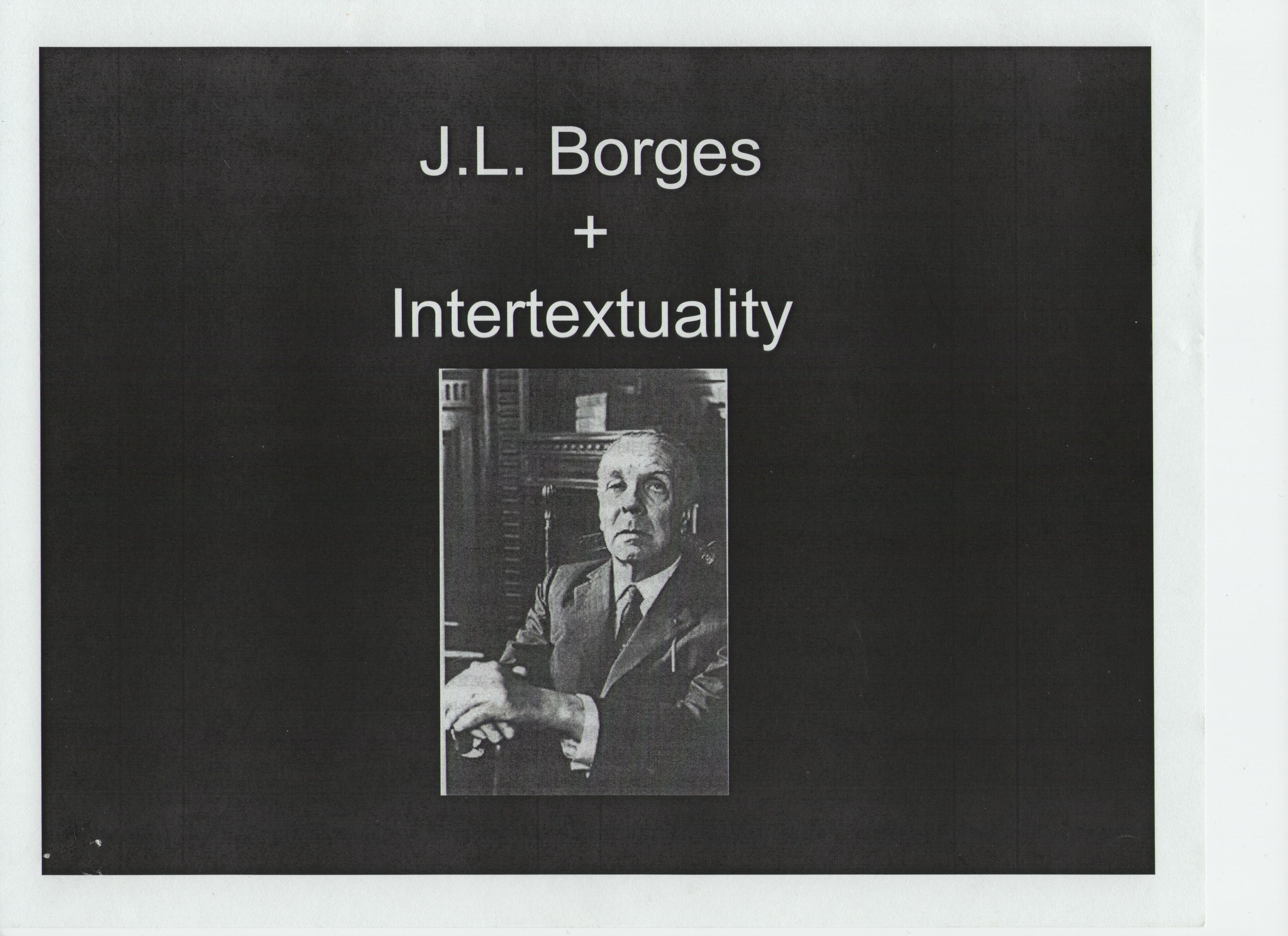
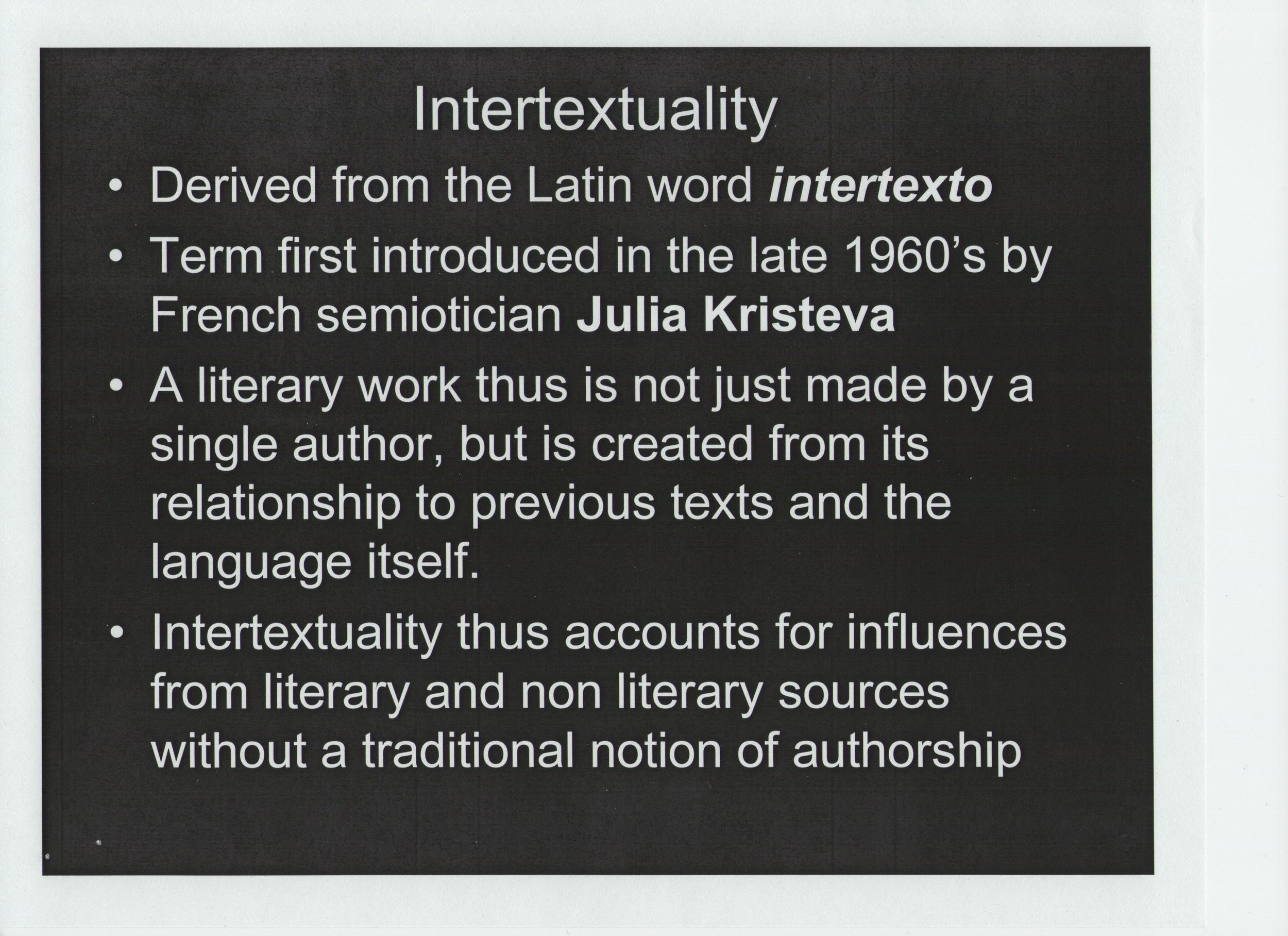
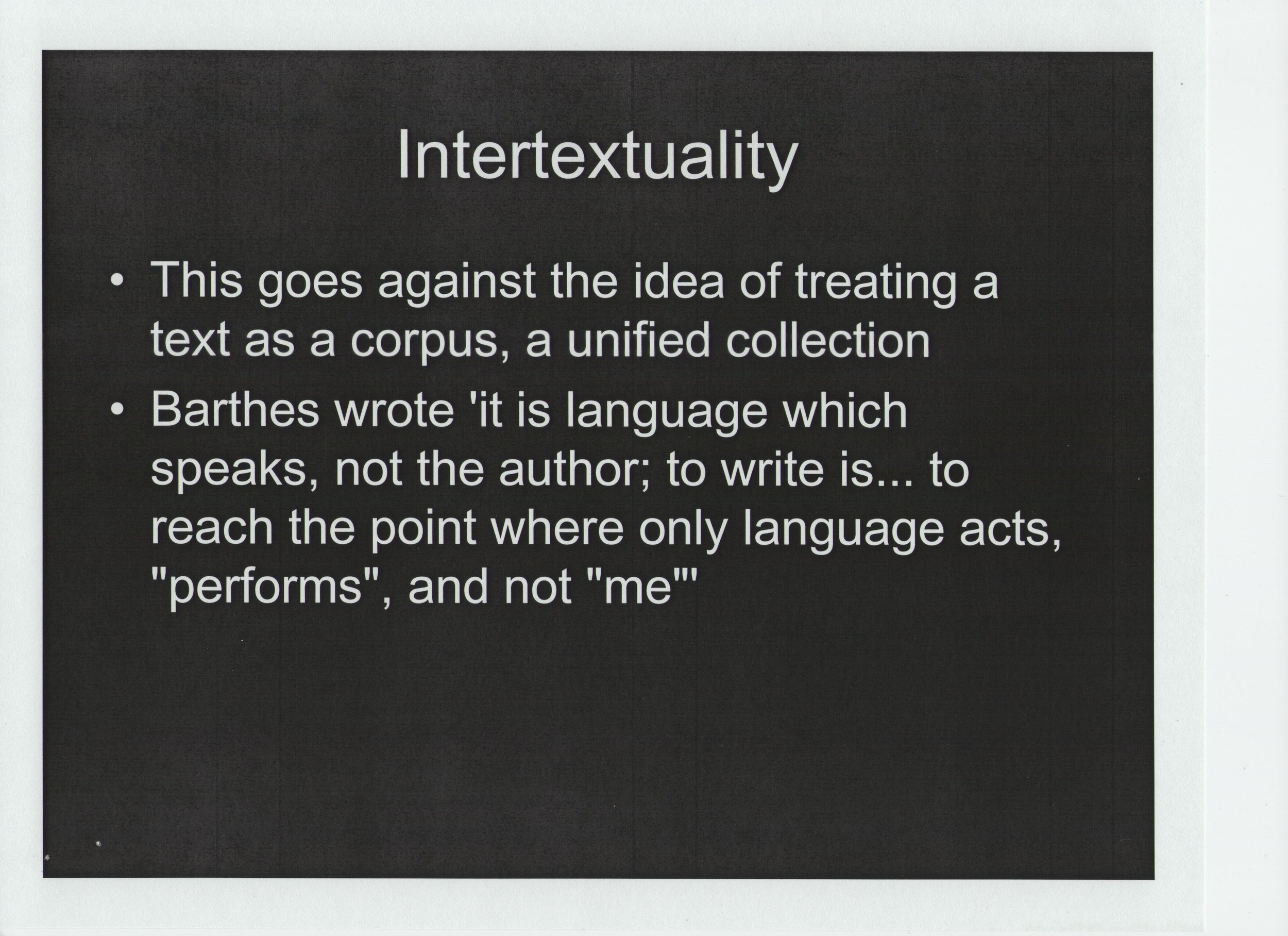
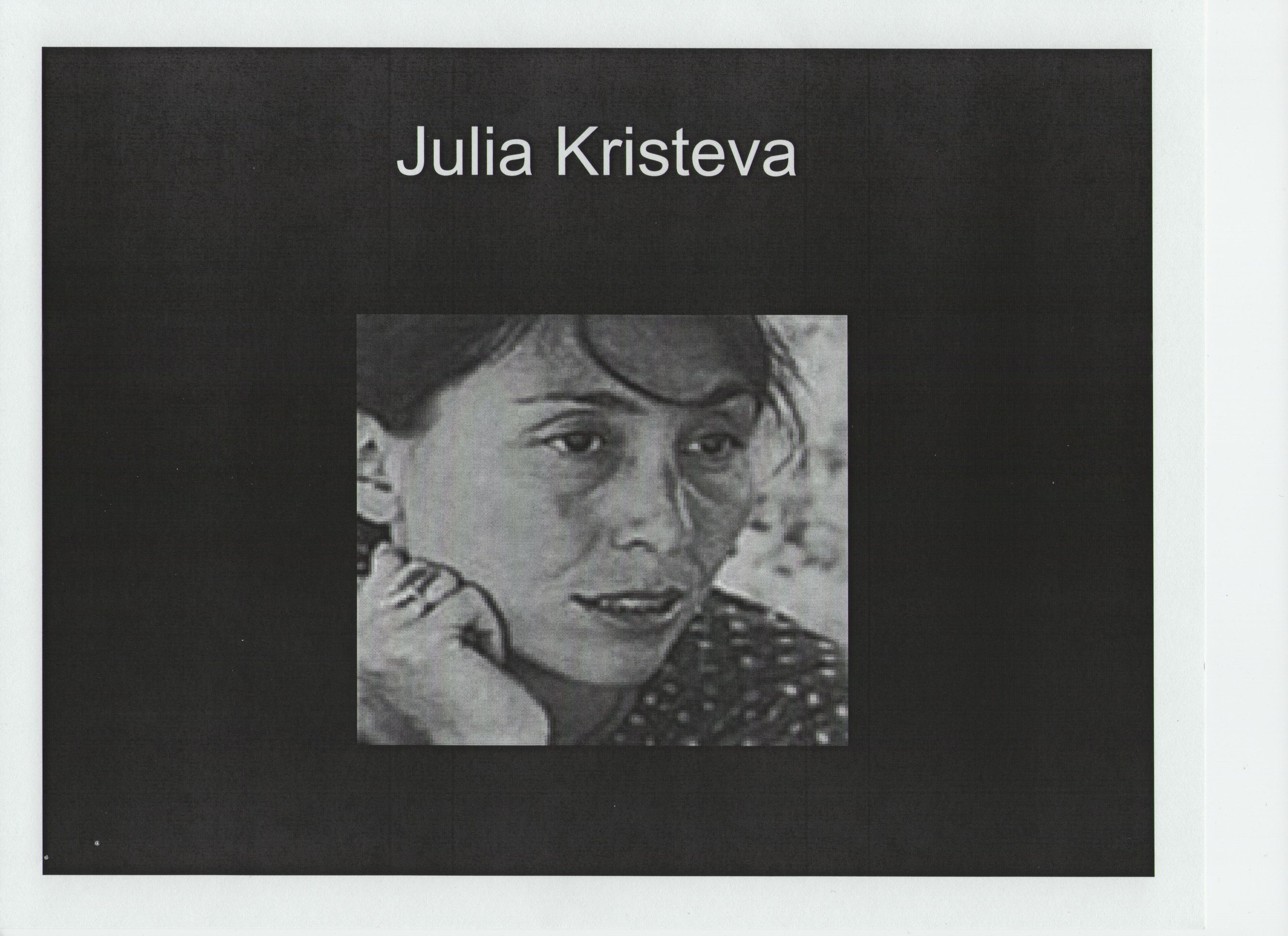
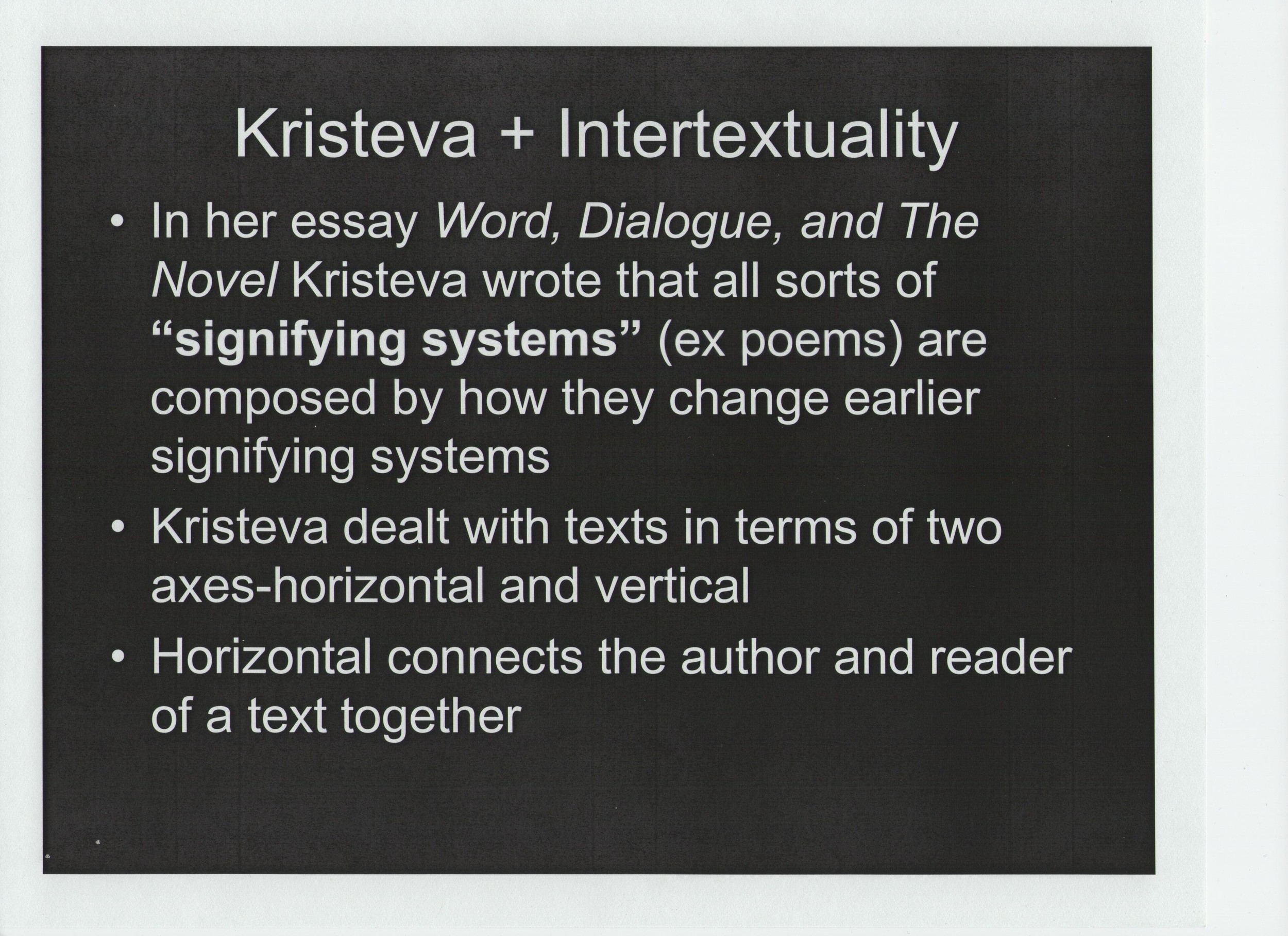
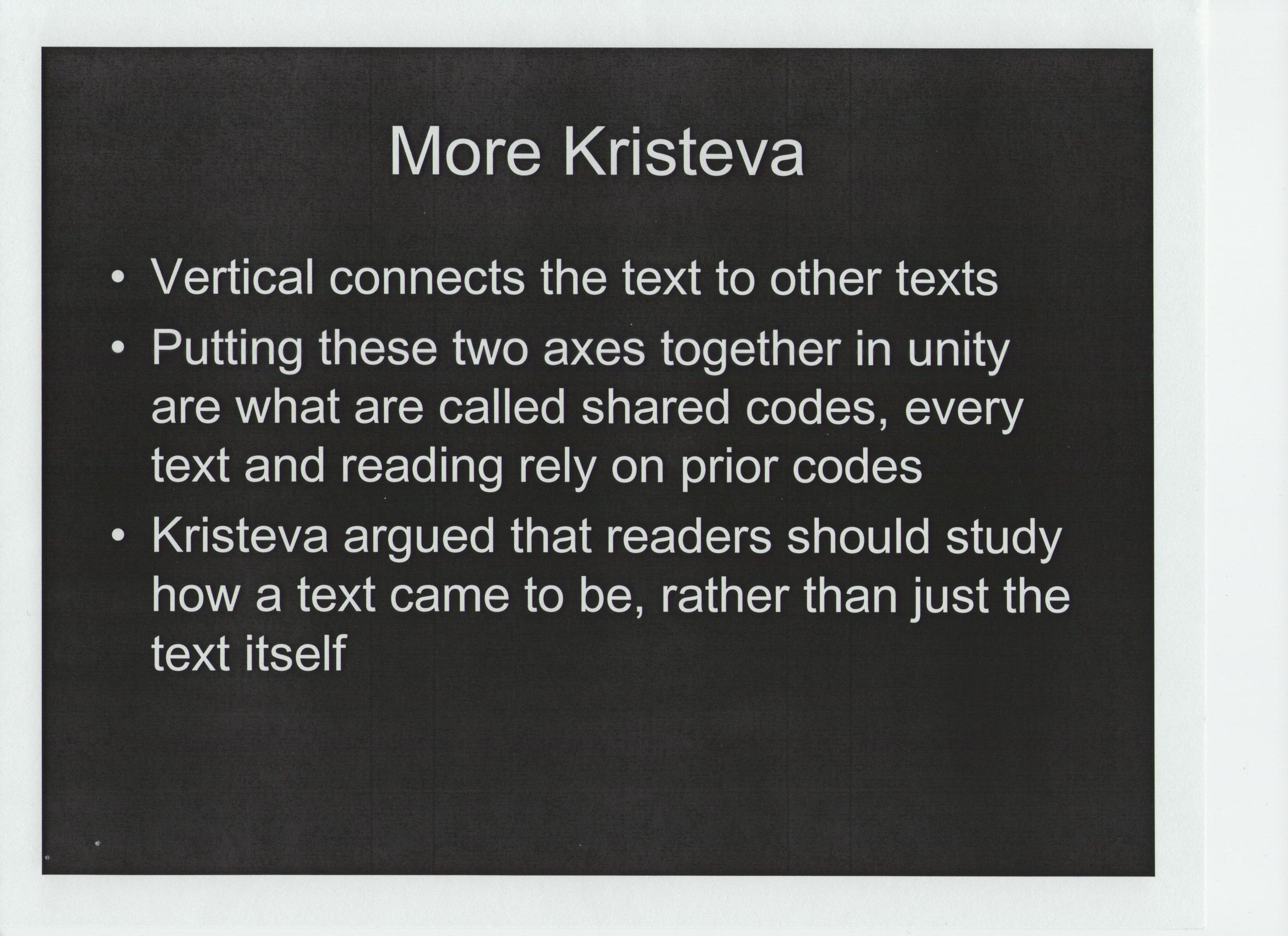
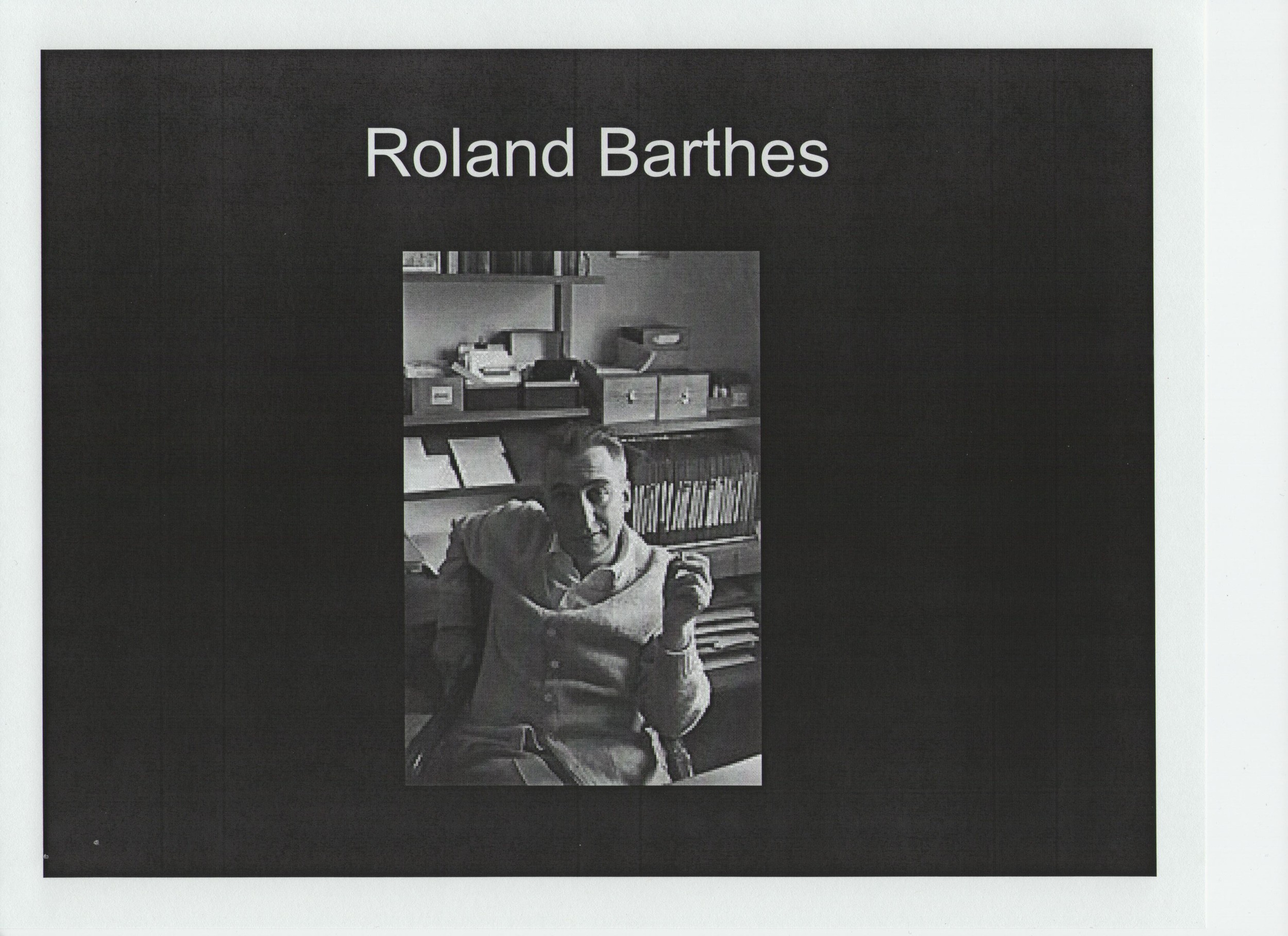
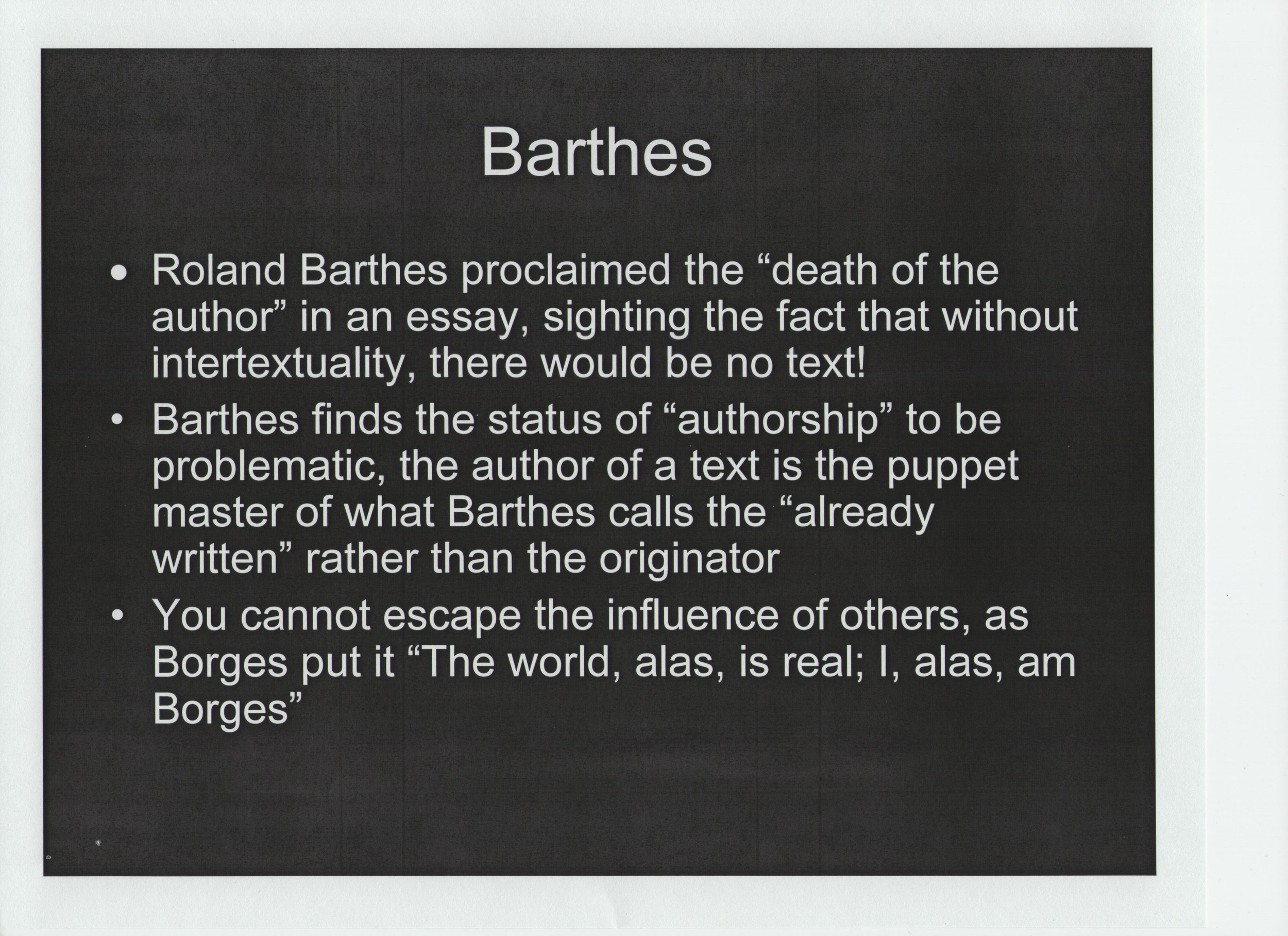
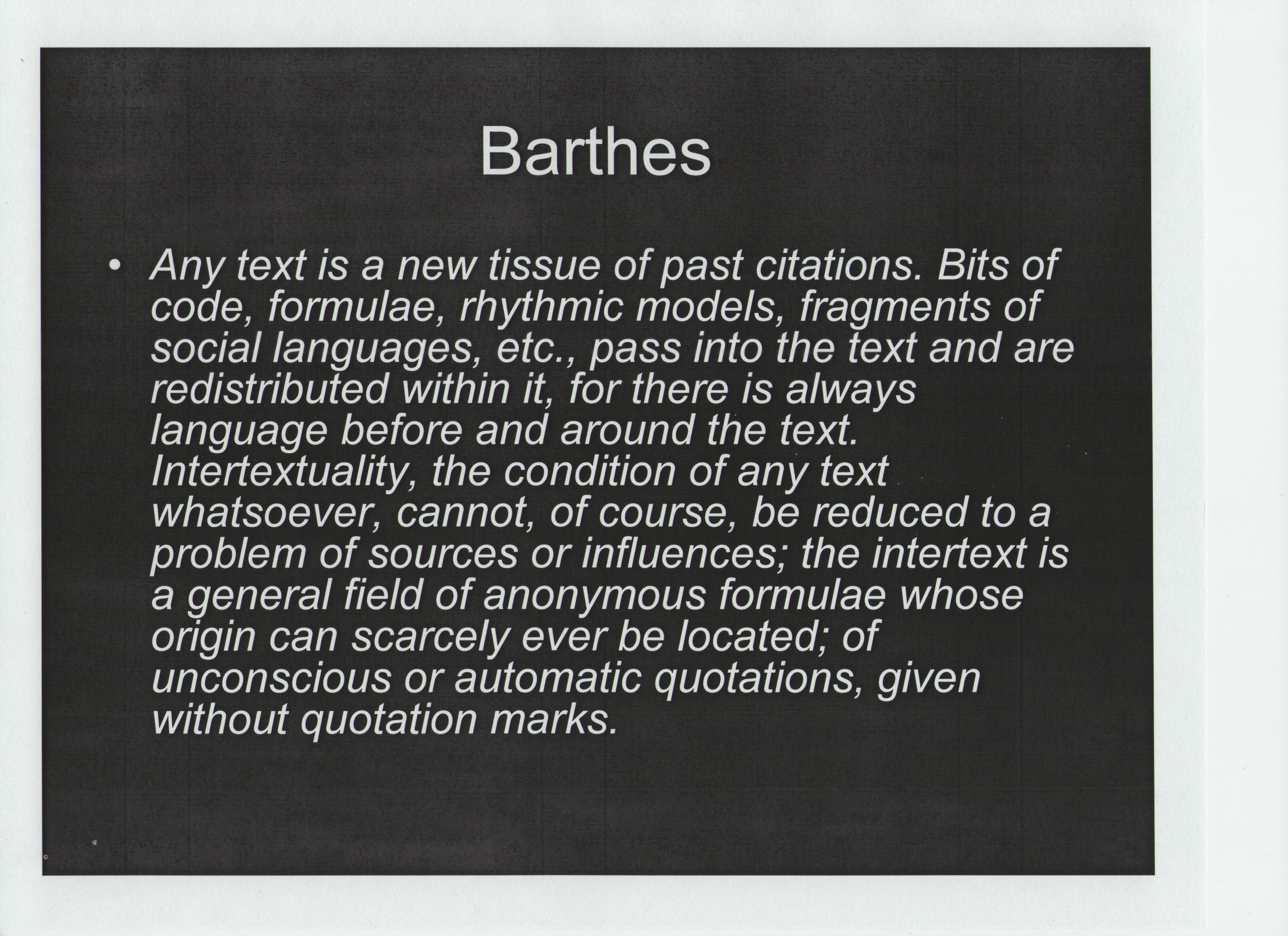
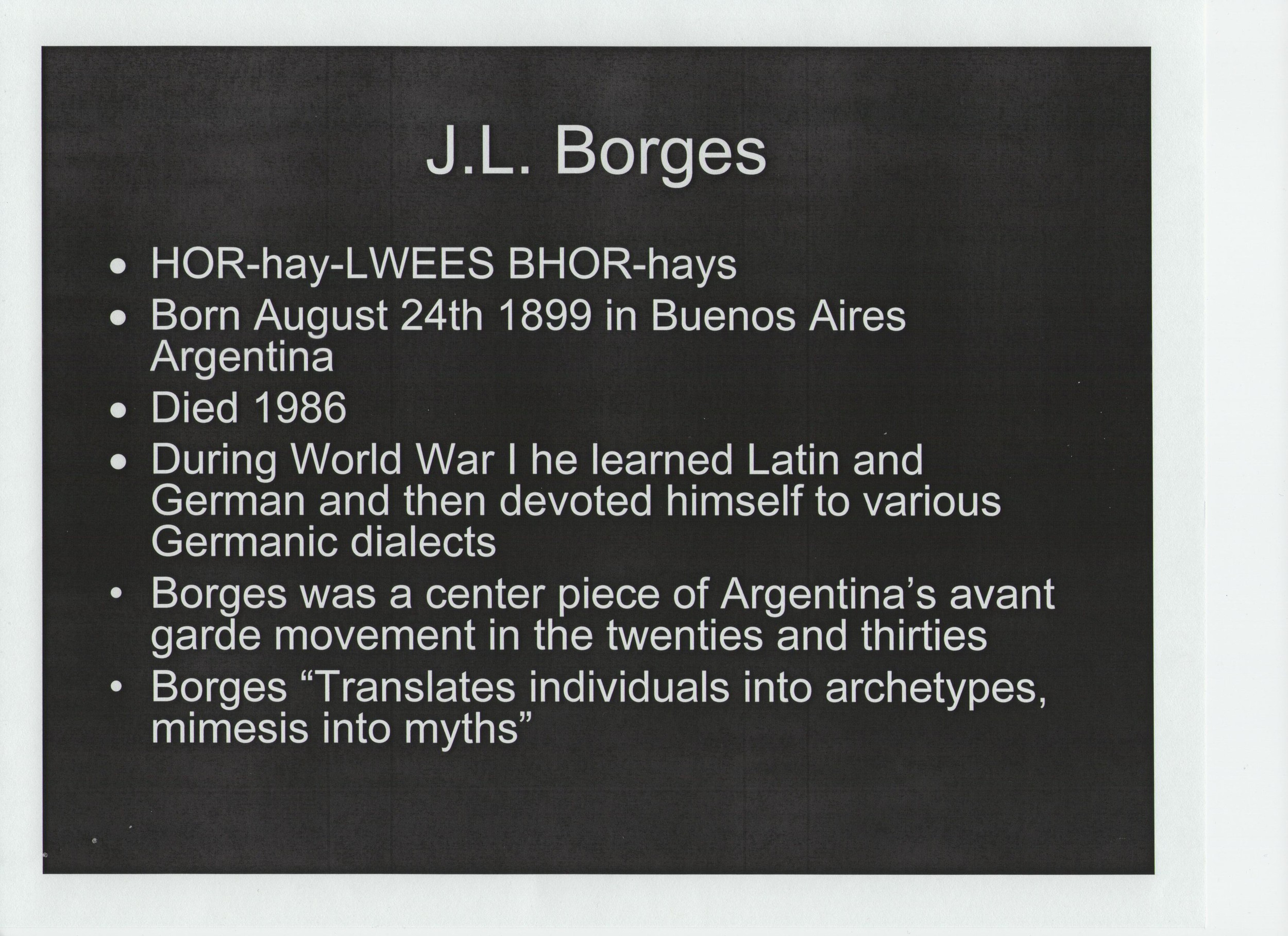

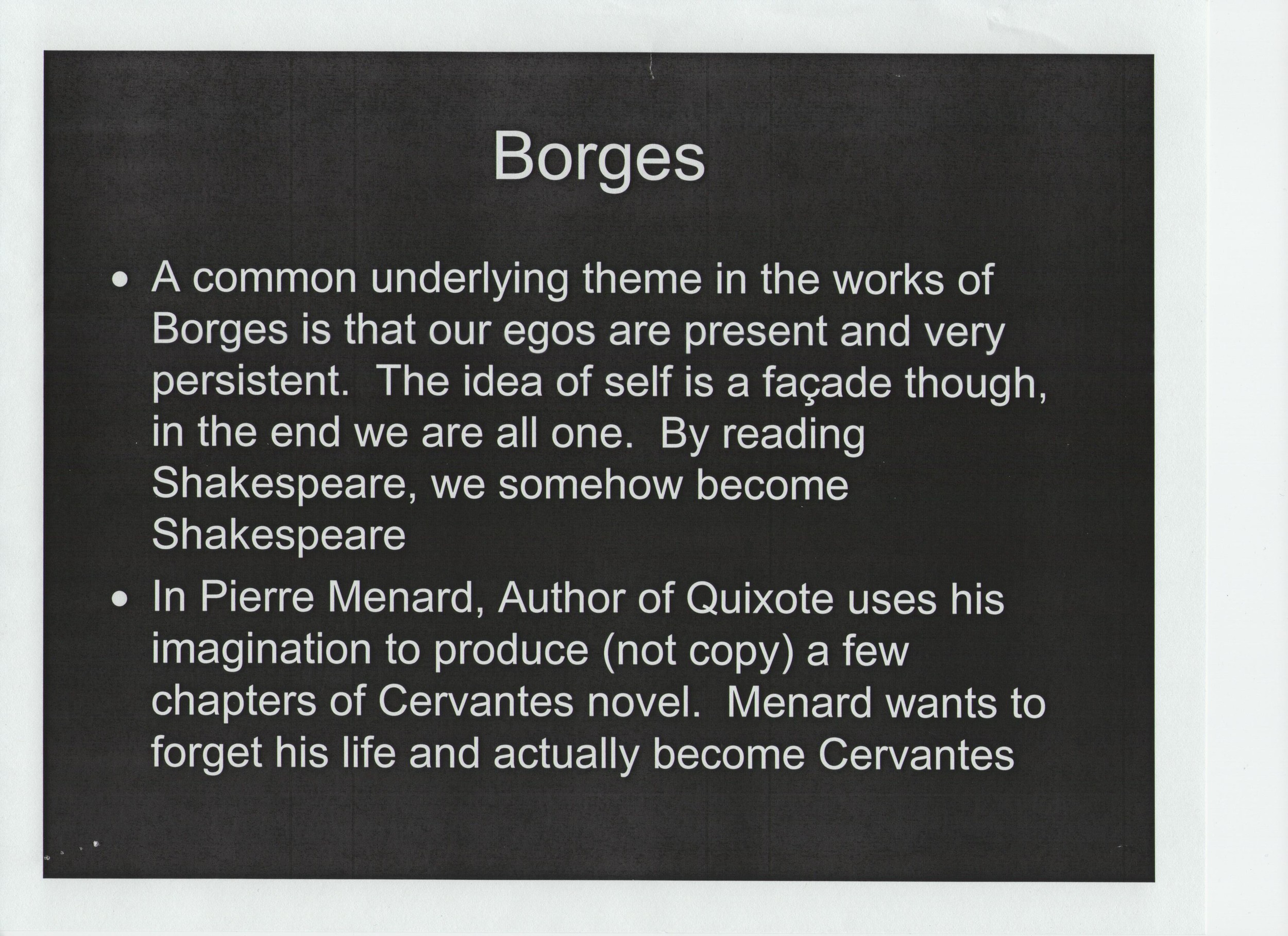
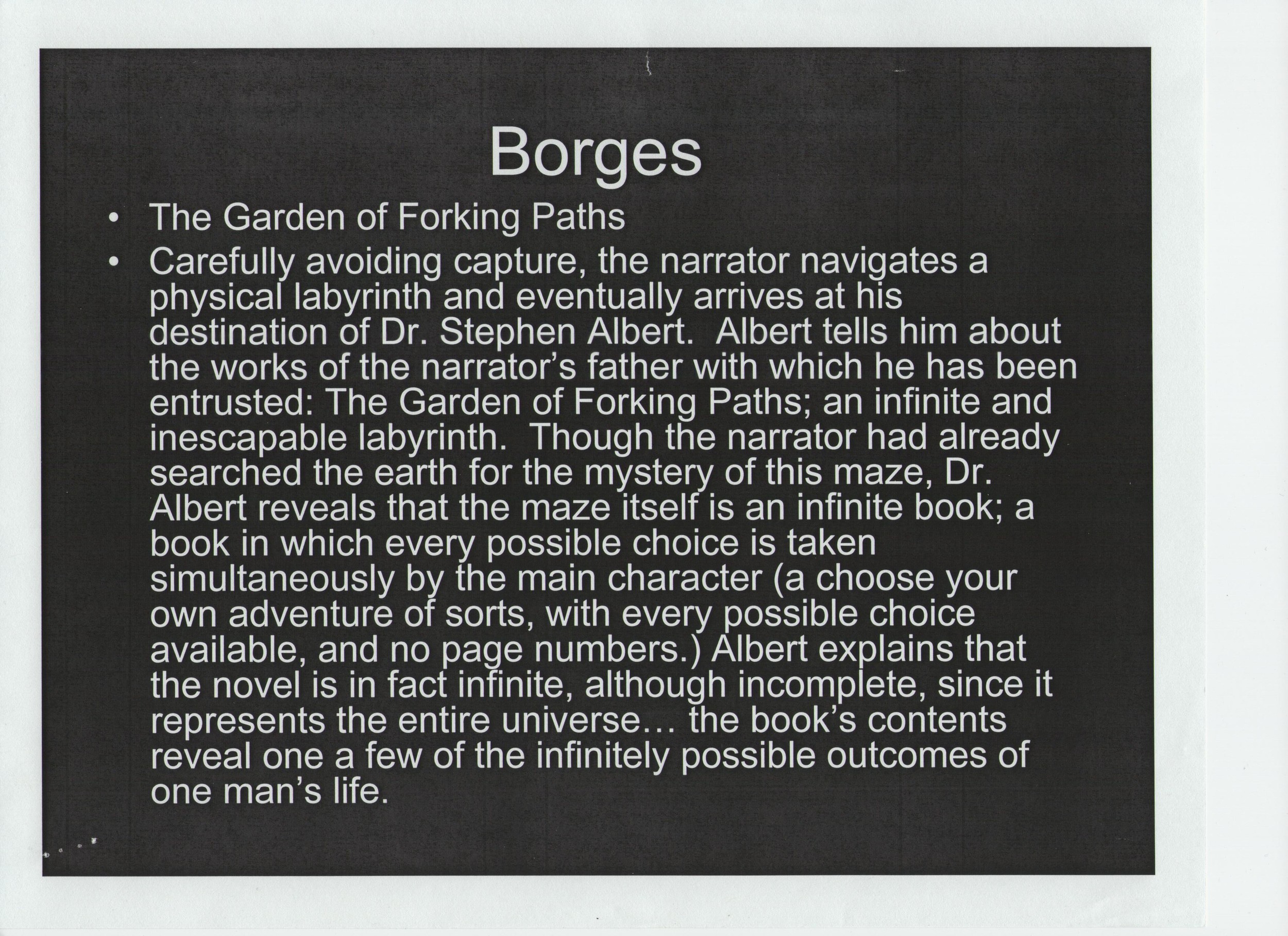
My Digital Humanities Origin
In its original draft, this was part of the introduction to my MA thesis. After some discussion, I ended up pulling this out to keep my thesis more focused on the matters at hand. I really like what I wrote here so I decided to excerpt it on my domain for my readers. I wrote this right around this time last year.
Everything I found in electronic literature upon discovery, the intellectual aesthetic and interplay with computers, which had been my cherished companion since childhood, I had been looking, searching, for in my literary studies. As a child I had played some text adventures, known as interactive fiction, and certainly remember their printed cousins the Choose Your Own Adventure book. I loved how interactive those books were and the agency which readers were given to decide their own fate and reading path. Growing up, I had a lot of problems with motor development and coordination. This led to many other problems including very poor penmanship. A wise teacher, when I was in elementary school, suggested my parents buy me a computer. She claimed that I would end up ahead of the curve because personal computers were going to takeover classrooms before I left for college. Wisely, my parents took her advice and purchased an Apple II for me to do my school work on and, because I did not play well with other children, to have an outlet for play and creativity.
Long before I became an avid reader in my teens, my creativity came almost exclusively from computers. Game designer Jane McGonigal’s recent weblog post about her experience creating detailed narratives out of Apple II games that did not already have them like Summer Games brought back memories from my own childhood. I had a similar experience at almost the same time by creating forms in a word processing program with different countries and names. I created brief backgrounds for each character and had them compete against each other on screen. Scandal, same gender romance, athletic achievement, and other intrigues played out in this interpretation of my gaming experience. I would not call that literature, obviously, but I tell this story to show how my creativity was electronically nourished before I embraced print culture later in my teens.
I have been on the Internet since sometime in early 1995. Immediately I became involved with participatory online culture by writing fan fiction, posting to newsgroups and listservs, chatting on Internet Relay Chat (IRC) and, on and off, creating journals which nowadays would be called a weblog. At the same time, I published print based punk rock fanzines periodically until 2005 when I began Signifying Nothing, a webzine, archive of my earlier fanzines, and podcast devoted to my endeavors in hardcore punk which continue to this day.
My interest in electronic literature came to fruition while taking a senior seminar on postmodernism with Scott Rettberg in the spring of 2004. While being turned onto writers like Italo Calvino, John Barth, Jorge Luis Borges, and theorists like George Landow, Roland Barthes, and Julia Kristeva I realized that not only were these fiction writers exactly what I had longed for all of my life from literature, but the bridge between literary theory I fell in love with from Kristeva and Barthes, which I had struggled with until this time, and computers which Landow and others like Rettberg himself bridged via their theories was a dream come true. The beginning years of my college career were filled with frustration, failure, and difficulty. The first step of my recovery came when I embraced electronic literature.
Reading hypertext fiction and the theories of Barthes and Kristeva in Rettberg’s seminar improved my readings of previously read authors like Faulkner, Woolf, and Wallace. I began researching electronic literature and exploring the links on Rettberg’s weblog. Through these links I was able to explore the work of other hypertext and New Media theorists like Nick Montfort, Angela Thomas, and Jill Walker. I experimented with and clicked through Rettberg’s hypertext novel, The Unknown, and began actively participating in the sticker novel he authored with Montfort. As the semester wound down, two classmates and myself began our own weblogs, inspired with Rettberg and Walker especially, and I moved mine to its own domain later that summer.
Since the rise of the novel the past few centuries have had some hypertextesque works of literature. Novels like Tristram Shandy, Infinite Jest, and Ulysses can seem to those familiar with the workings of electronic literature to have qualities which “stand out for the first time.” (Landow 1982) When I read Sterne’s novel in an undergraduate course on the history of the novel, I came in one morning and remarked to my professor that the novel had a lot of the qualities of hypertext fiction which I was learning about in Rettberg’s seminar on postmodernism the same semester. Without knowledge of electronic literature I would have never made the connection, which made my reading of Sterne’s novel much more pleasurable. Experimental works of literature like Pavic’s Dictinary Of The Khazars and Nabakov’s Pale Fire also exude qualities which are emphasized by an understanding and familiarity with hypertext and electronic literature.
As Janet Murray argues in Hamlet On The Holodeck: The Future Of Narrative In Cyberspace, “the impending dissolution of Yugoslavia,” in Dictinary Of The Khazars, “is preconfigured by the fragmentary account of a mythical lost tribe” of three separate, conflicting, dictionaries (Murray 37). The “multicursally” seen in Pale Fire has been seen as a branch between not only modernism and postmodernism but as a text that has hypertextesque qualities (Aarseth 8). Writers like Robert Coover, a longtime advocate of electronic literature, Borges, and other postmodernists from France and South America also write literature which embodies many aspects of hypertext fiction.

